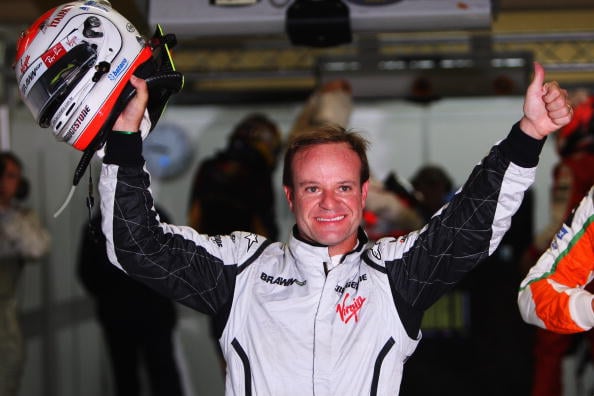What is Rubens Barrichello’s net worth?
Rubens Barrichello is a Brazilian racing driver who has a net worth of $100 million.
Rubens Barrichello stands as one of Formula One’s most enduring figures, holding the record for most Grand Prix starts with 322 races across a remarkable 19-season career. While often remembered as Michael Schumacher’s loyal teammate at Ferrari during their dominant years, Barrichello’s career encompasses far more than his supporting role. His combination of speed, consistency, and adaptability made him one of F1’s most respected drivers, earning 11 race victories and finishing runner-up in the 2002 and 2004 World Championships. Though never securing a World Championship himself, Barrichello’s longevity and contributions to multiple successful teams have left an indelible mark on the sport.
Early Racing Career
Born in São Paulo on May 23, 1972, Barrichello began karting at age nine, following in the footsteps of Brazil’s rich motorsport heritage. He quickly showed promise, winning multiple karting championships before moving to single-seaters. His success in British Formula 3, where he won the championship in 1991, marked him as a future Formula One prospect. This triumph led to his F1 debut with the Jordan team in 1993 at just 20 years old.
Formula One Journey
Barrichello’s early years in F1 with Jordan showed flashes of brilliance, including a remarkable pole position at the 1994 Belgian Grand Prix. After moving to Stewart Racing, he achieved his first podium finishes and helped develop the team into a competitive force. However, his career-defining move came in 2000 when he joined Ferrari alongside Michael Schumacher.
Ferrari Years
The Ferrari period (2000-2005) marked both the height of Barrichello’s success and his greatest challenge. As Schumacher’s teammate during Ferrari’s dominant era, he played a crucial role in securing six consecutive Constructors’ Championships. While this period brought him numerous victories and his highest championship finishes, it also saw him often playing a supporting role to Schumacher, most notably at the controversial 2002 Austrian Grand Prix where he was ordered to let Schumacher pass for the win.
Mark Thompson/Getty Images
Later Career and Legacy
After Ferrari, Barrichello enjoyed successful stints with Honda, Brawn GP, and Williams. His 2009 season with Brawn GP proved particularly noteworthy, as he challenged for the championship and secured multiple victories during the team’s fairy-tale championship year. His ability to adapt to different cars and regulations throughout his career demonstrated his exceptional technical understanding and driving versatility.
Post-Formula One
Following his F1 career, Barrichello continued racing in various series, including IndyCar and Brazilian Stock Cars, where he won the championship in 2014. His passion for racing remained undiminished, proving that his longevity in F1 was no accident but rather a testament to his enduring love for motorsport.
Racing Style and Character
Known for his smooth driving style and technical feedback, Barrichello earned respect throughout the paddock for his professionalism and positive attitude. His ability to work effectively with engineers and develop cars made him a valuable asset to every team he joined. Despite the challenges and sometimes difficult positions he faced, particularly at Ferrari, he maintained his reputation as one of the sport’s most genuine and well-liked personalities.
Personal Life and Influence
Off the track, Barrichello’s influence on Brazilian motorsport continues through his support of young drivers and involvement in racing. His son Eduardo has followed him into racing, with Rubens actively supporting the next generation of Brazilian racing talent. His openness about his experiences in F1, including the pressures of being Schumacher’s teammate and the evolution of the sport, has provided valuable insights into one of F1’s most significant eras.
Barrichello’s career represents more than just statistics; it demonstrates the value of persistence, adaptability, and professionalism in motorsport. While he may not have achieved the ultimate prize of a World Championship, his contribution to Formula One and his influence on the sport’s development during its most technologically progressive era ensure his place among racing’s most significant figures.
All net worths are calculated using data drawn from public sources. When provided, we also incorporate private tips and feedback received from the celebrities or their representatives. While we work diligently to ensure that our numbers are as accurate as possible, unless otherwise indicated they are only estimates. We welcome all corrections and feedback using the button below.

